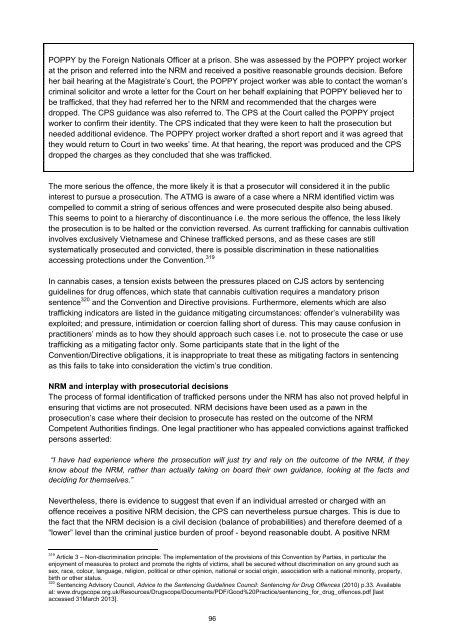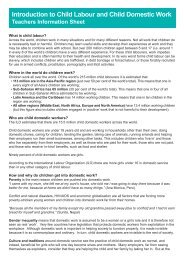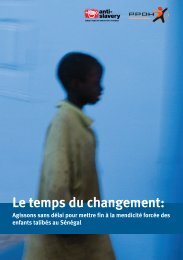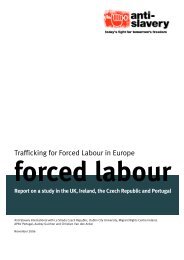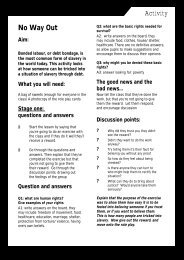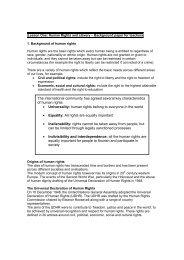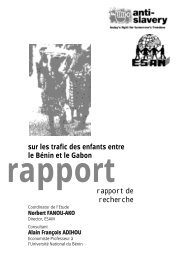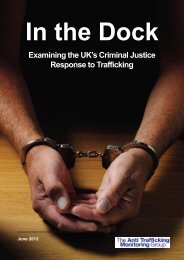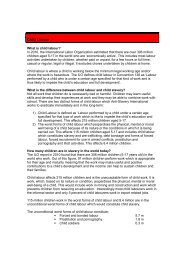POPPY by <strong>the</strong> Foreign Nationals Officer at a prison. She was assessed by <strong>the</strong> POPPY project workerat <strong>the</strong> prison and referred into <strong>the</strong> NRM and received a positive reasonable grounds decision. Beforeher bail hearing at <strong>the</strong> Magistrate’s Court, <strong>the</strong> POPPY project worker was able to contact <strong>the</strong> woman’scriminal solicitor and wrote a letter for <strong>the</strong> Court on her behalf explaining that POPPY believed her tobe trafficked, that <strong>the</strong>y had referred her to <strong>the</strong> NRM and recommended that <strong>the</strong> charges weredropped. The CPS guidance was also referred to. The CPS at <strong>the</strong> Court called <strong>the</strong> POPPY projectworker to confirm <strong>the</strong>ir identity. The CPS indicated that <strong>the</strong>y were keen to halt <strong>the</strong> prosecution butneeded additional evidence. The POPPY project worker drafted a short report and it was agreed that<strong>the</strong>y would return to Court in two weeks’ time. At that hearing, <strong>the</strong> report was produced and <strong>the</strong> CPSdropped <strong>the</strong> charges as <strong>the</strong>y concluded that she was trafficked.The more serious <strong>the</strong> offence, <strong>the</strong> more likely it is that a prosecutor will considered it in <strong>the</strong> publicinterest to pursue a prosecution. The ATMG is aware of a case where a NRM identified victim wascompelled to commit a string of serious offences and were prosecuted despite also being abused.This seems to point to a hierarchy of discontinuance i.e. <strong>the</strong> more serious <strong>the</strong> offence, <strong>the</strong> less likely<strong>the</strong> prosecution is to be halted or <strong>the</strong> conviction reversed. As current trafficking for cannabis cultivationinvolves exclusively Vietnamese and Chinese trafficked persons, and as <strong>the</strong>se cases are stillsystematically prosecuted and convicted, <strong>the</strong>re is possible discrimination in <strong>the</strong>se nationalitiesaccessing protections under <strong>the</strong> Convention. 319<strong>In</strong> cannabis cases, a tension exists between <strong>the</strong> pressures placed on CJS actors by sentencingguidelines for drug offences, which state that cannabis cultivation requires a mandatory prisonsentence 320 and <strong>the</strong> Convention and Directive provisions. Fur<strong>the</strong>rmore, elements which are alsotrafficking indicators are listed in <strong>the</strong> guidance mitigating circumstances: offender’s vulnerability wasexploited; and pressure, intimidation or coercion falling short of duress. This may cause confusion inpractitioners’ minds as to how <strong>the</strong>y should approach such cases i.e. not to prosecute <strong>the</strong> case or usetrafficking as a mitigating factor only. Some participants state that in <strong>the</strong> light of <strong>the</strong>Convention/Directive obligations, it is inappropriate to treat <strong>the</strong>se as mitigating factors in sentencingas this fails to take into consideration <strong>the</strong> victim’s true condition.NRM and interplay with prosecutorial decisionsThe process of formal identification of trafficked persons under <strong>the</strong> NRM has also not proved helpful inensuring that victims are not prosecuted. NRM decisions have been used as a pawn in <strong>the</strong>prosecution’s case where <strong>the</strong>ir decision to prosecute has rested on <strong>the</strong> outcome of <strong>the</strong> NRMCompetent Authorities findings. One legal practitioner who has appealed convictions against traffickedpersons asserted:“I have had experience where <strong>the</strong> prosecution will just try and rely on <strong>the</strong> outcome of <strong>the</strong> NRM, if <strong>the</strong>yknow about <strong>the</strong> NRM, ra<strong>the</strong>r than actually taking on board <strong>the</strong>ir own guidance, looking at <strong>the</strong> facts anddeciding for <strong>the</strong>mselves.”Never<strong>the</strong>less, <strong>the</strong>re is evidence to suggest that even if an individual arrested or charged with anoffence receives a positive NRM decision, <strong>the</strong> CPS can never<strong>the</strong>less pursue charges. This is due to<strong>the</strong> fact that <strong>the</strong> NRM decision is a civil decision (balance of probabilities) and <strong>the</strong>refore deemed of a“lower” level than <strong>the</strong> criminal justice burden of proof - beyond reasonable doubt. A positive NRM319Article 3 – Non-discrimination principle: The implementation of <strong>the</strong> provisions of this Convention by Parties, in particular <strong>the</strong>enjoyment of measures to protect and promote <strong>the</strong> rights of victims, shall be secured without discrimination on any ground such assex, race, colour, language, religion, political or o<strong>the</strong>r opinion, national or social origin, association with a national minority, property,birth or o<strong>the</strong>r status.320Sentencing Advisory Council, Advice to <strong>the</strong> Sentencing Guidelines Council: Sentencing for Drug Offences (2010) p.33. Availableat: www.drugscope.org.uk/Resources/Drugscope/Documents/PDF/Good%20Practice/sentencing_for_drug_offences.pdf [lastaccessed 31March 2013].96
decision can be taken into account by <strong>the</strong> prosecutor, but does not automatically lead to <strong>the</strong>discontinuation of <strong>the</strong> prosecution. This demonstrates <strong>the</strong> strength of <strong>the</strong> CPS’s decision-makingpower and <strong>the</strong>refore its responsibility in <strong>the</strong>se cases. Also, judges attach great significance to positiveNRM conclusive grounds decisions in granting bail. The CPS states that NRM decisions will beexpedited in <strong>the</strong>se circumstances. However, from our research this information has yet to trickle downto <strong>the</strong> frontline. This approach to prosecution decisions is concerning given <strong>the</strong> difficulties with <strong>the</strong>NRM discussed in Chapter 5.Case law on non-criminalisation<strong>In</strong> <strong>the</strong> 2010 case of R v LM and O<strong>the</strong>rs, 321 and recently in R v N; R v LE 322 of 2012, it was held that<strong>the</strong> CPS could still prosecute however strong <strong>the</strong> evidence of trafficking. <strong>In</strong> R v LM and O<strong>the</strong>rs, <strong>the</strong>judge found that <strong>the</strong> Article 26 obligation should be interpreted, as “no more, but no less, than thatcareful consideration must be given to whe<strong>the</strong>r public policy calls for a prosecution and punishment”.<strong>In</strong> this case <strong>the</strong> guilty pleas were entered on <strong>the</strong> basis that <strong>the</strong>y were trafficked victims and that <strong>the</strong>ywere compelled to commit <strong>the</strong> offence. At <strong>the</strong> time <strong>the</strong> pleas were accepted by <strong>the</strong> CPS, it was heldthat <strong>the</strong> CPS should have consciously applied its own Guidance, of which it was aware, but failed todo so. It was on this basis of a technicality that <strong>the</strong> appeals were allowed, as if <strong>the</strong> CPS had applied“its mind conscientiously to <strong>the</strong> question of public policy and reach an informed decision”, it might nothave decided to prosecute. 323R v N; R v LE was cited as creating an adverse Court of Appeal precedent in <strong>the</strong> UK for traffickedpersons being prosecuted for crimes <strong>the</strong>y were compelled to commit. This case concerned traffickingfor forced cannabis cultivation of two Vietnamese nationals who were under 18 years old at <strong>the</strong> time<strong>the</strong>y were discovered by police. N was locked inside <strong>the</strong> property and <strong>the</strong> windows were boarded up,and <strong>the</strong> traffickers threatened him with death if he escaped. They had originally pleaded guilty on <strong>the</strong>advice of <strong>the</strong>ir defence solicitors. The UKBA confirmed <strong>the</strong>ir status as trafficked through positive NRMconclusive grounds decisions. However, <strong>the</strong> Court of Appeal affirmed <strong>the</strong> conviction despitedisclosure of coercion, including threats to <strong>the</strong>ir lives and, in one case, evidence that <strong>the</strong> cannabisfactory was locked from <strong>the</strong> outside, <strong>the</strong>refore suggesting that control was being exerted over <strong>the</strong>m.Following from <strong>the</strong> precedent set in R v LM and O<strong>the</strong>rs, <strong>the</strong> Lord Chief Justice in R v N; R v LEaffirmed that full responsibility for <strong>the</strong> decision whe<strong>the</strong>r to prosecute is vested in <strong>the</strong> CPS: “Thisrequires a judgment to be made by <strong>the</strong> CPS in <strong>the</strong> individual case in <strong>the</strong> light of all <strong>the</strong> availableevidence. That responsibility is vested not in <strong>the</strong> court but in <strong>the</strong> prosecuting authority … in <strong>the</strong> contextof <strong>the</strong> proper implementation of <strong>the</strong> United Kingdom's Convention obligation does not involve <strong>the</strong>creation of new principles.” 324 Therefore, <strong>the</strong> prosecutor is under a duty, in <strong>the</strong> appropriatecircumstance, to discontinue such cases or offer no evidence where <strong>the</strong> case has progressed to <strong>the</strong>court stage; or if it had offered evidence, an application for a stay of <strong>the</strong> proceedings should be madewhere it is not in <strong>the</strong> public interest or <strong>the</strong>re is a defence of duress.<strong>In</strong> <strong>the</strong> absence of a stay, it is for a jury to decide on <strong>the</strong> facts whe<strong>the</strong>r <strong>the</strong> person committed <strong>the</strong> crime.The defence of duress can be presented to a jury but because of <strong>the</strong> difficulties explained earlier thishas not usually been successful. It should also be noted that articles 26 and 8 do not provide adefence that may be advanced before a jury. It may, however, be advanced as a mitigatingcircumstance that may be taken into consideration by <strong>the</strong> judge in sentencing or form <strong>the</strong> basis of aconditional or absolute discharge.R v N; R v LE is one of two cases involving two Vietnamese boys that have since been lodged with<strong>the</strong> European Court of Human Rights. Fur<strong>the</strong>rmore, <strong>the</strong>re are currently four trafficking cases (including321R v LM and O<strong>the</strong>rs [2010] EWCA Crim 2327.322R v N; R v LE [2012] EWCA Crim 189.323R v LM, supra note 321, para. 21.324R v N; R v LE, supra note 322, para.21.97
- Page 1 and 2:
In the DockExamining the UK’s Cri
- Page 3 and 4:
AcknowledgementsThis report was mad
- Page 5 and 6:
PrefaceIn May 2009, a group of nine
- Page 7 and 8:
Misconceptions around exploitation
- Page 9 and 10:
Acronyms and abbreviations frequent
- Page 11 and 12:
Executive SummaryIn the Dock is The
- Page 13 and 14:
Furthermore, the current legislatio
- Page 15 and 16:
The ATMG was made aware of some cas
- Page 17 and 18:
• Introduce mandatory child-speci
- Page 19 and 20:
• The UK’s ability to meet the
- Page 21 and 22:
Traffickers’ primary motivation i
- Page 23 and 24:
• Money launderers - turn profits
- Page 25 and 26:
out to perpetuate the exploitative
- Page 27 and 28:
[their] own enslavement” is as fu
- Page 29 and 30:
Chapter 2: UK Anti-Trafficking Legi
- Page 31 and 32:
nationals who commit trafficking of
- Page 33 and 34:
Like the SOA, the “act” element
- Page 35 and 36:
(b) D requires another person to pe
- Page 37 and 38:
Forced or compulsory labourThe defi
- Page 39 and 40:
ConclusionAs a consequence of the s
- Page 41 and 42:
concerningly, the number of convict
- Page 43 and 44:
women who were recruited in Poland
- Page 45 and 46:
Chapter 4: Identifying trafficking
- Page 47 and 48: Misconceptions around exploitationT
- Page 49 and 50: espond inadequately to a trafficked
- Page 51 and 52: multi-agency teams was described by
- Page 53 and 54: Josie Connors. 179 In summary, inte
- Page 55 and 56: defending a trafficked person for f
- Page 57 and 58: “[B]ecause the NRM decision is on
- Page 59 and 60: PTSD. 196 A Consultant Psychiatrist
- Page 61 and 62: etween the client and the police, i
- Page 63 and 64: Regular communication needs to be s
- Page 65 and 66: Priority planningA particular issue
- Page 67 and 68: Chapter 6: Multi-agency and interna
- Page 69 and 70: canvassing for tarmacking opportuni
- Page 71 and 72: Despite this, it would appear that
- Page 73 and 74: Good practice - Operation Golf 229O
- Page 75 and 76: Chapter 7: Criminal proceedingsThe
- Page 77 and 78: Law enforcement working on the case
- Page 79 and 80: trafficking require particular unde
- Page 81 and 82: JuryPractitioners suggested that th
- Page 83 and 84: years”. 258 Ambiguity within the
- Page 85 and 86: officer stated that not all judges
- Page 87 and 88: jurors to be assisted with expert e
- Page 89 and 90: Good feedback was received from sem
- Page 91 and 92: The Convention does recognise that
- Page 93 and 94: Another option for trafficked victi
- Page 95 and 96: There are two models with respect t
- Page 97: 1. Is there clear evidence that the
- Page 101 and 102: also entails being “alert to the
- Page 103 and 104: In some cases concerns were even ra
- Page 105 and 106: Chapter 9: Prosecuting child traffi
- Page 107 and 108: However, many children are not refe
- Page 109 and 110: trafficking”. 352 It states: “W
- Page 111 and 112: Previous research has found that th
- Page 113 and 114: children as well as assisting in pr
- Page 115 and 116: Child trafficking trainingThere is
- Page 117 and 118: were too traumatic to involve them
- Page 119 and 120: committed by a child whilst in a co
- Page 121 and 122: • Introduce mandatory child-speci
- Page 123 and 124: IdentificationThe PSNI is the main
- Page 125 and 126: participants suggest that this is b
- Page 127 and 128: The PPS stated that the reasons for
- Page 129 and 130: this research was aware of potentia
- Page 131 and 132: convictions of traffickers prosecut
- Page 133 and 134: Possibly in response to certain hur
- Page 135 and 136: espectively. In addition to custodi
- Page 137 and 138: Conclusion and RecommendationsThe A
- Page 139 and 140: CRIMINAL PROCEEDINGS• Ensure that
- Page 141 and 142: Crown Prosecution Service, Legal Gu
- Page 143 and 144: Herman. J. Trauma and Recovery: The
- Page 145 and 146: Annex I: Trafficking and other form
- Page 147 and 148: (a) on summary conviction, to impri
- Page 149 and 150:
(b) which country is the country of
- Page 151 and 152:
2009 Istvan Kalocsai (Snr)MetS.57 o
- Page 153 and 154:
2009 causing actual bodily harm, su
- Page 155 and 156:
Skirmantas Kvedaras Feed, 2010 Rape
- Page 157 and 158:
2012 Ahdel Ali (24)Mubarek Ali (29)
- Page 159 and 160:
Annex III: The CPS’s Seven Stages
- Page 161 and 162:
159


